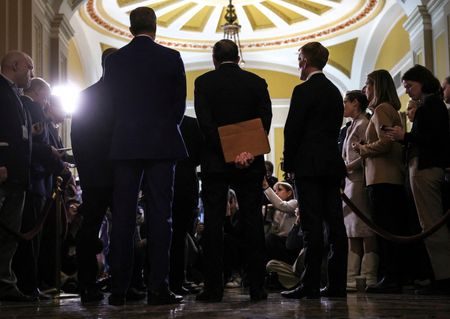By David Morgan
WASHINGTON (Reuters) – The Republican-led U.S. Senate, in a bid to overcome party infighting over President Donald Trump’s agenda, will begin moving forward as early as next week on a $300 billion, four-year plan to fund his border security and military priorities.
Senate Budget Committee Chairman Lindsey Graham told reporters on Wednesday that he expects to begin marking up a budget resolution that will also direct committees to find offsets for the new spending with hopes of Senate action in coming weeks. Republicans would pursue an extension for Trump’s 2017 tax cuts and other tax proposals under a separate plan later in the year.
Republicans in the Senate and some in the House of Representatives have called for Senate action on a two-bill strategy to overcome deep divisions on spending cuts that have clouded House efforts to enact Trump’s agenda in a single, all-encompassing bill.
“I hope to start as early as next week,” Graham, of South Carolina, said after presenting his plan to Senate Republicans over lunch. “The process will take a while. Hopefully, you know, not months but weeks.”
Trump is pushing lawmakers to extend his 2017 tax cuts, which are due to expire at the end of this year and are forecast to cost about $4 trillion over ten years, according to the non-partisan Committee for a Responsible Federal Budget. Some hardline House Republicans have been pushing for trillions of dollars in spending cuts to prevent the tax cuts from adding substantially to the federal government’s $36 trillion in debt.
According to Graham, the Senate budget resolution would spend approximately $150 billion to fund Trump’s border security and immigrant deportation plan and a roughly equal amount to bolster the U.S. military to deal with global threats.
House Speaker Mike Johnson, of Louisiana, has seen his hopes of passing a budget resolution by next week fall to infighting between hardline conservatives who want deep spending cuts and moderate Republicans concerned about how such cuts might affect public services in their districts.
The budget resolutions are needed to start the parliamentary process Republicans plan to use to bypass Democratic opposition in the Senate.
House Republicans huddled for days at a Trump resort in Miami last week to try to find consensus on a blueprint but have failed to clinch a deal.
Johnson has rejected assertions that time is running out for the House to act. But Senate Republicans said they see little reason to expect success in the House.
“The Senate can act. Hopefully we can lead and the House will start seeing the game plan,” said Republican Senator Ron Johnson of Wisconsin, a member of Graham’s panel. “I understand the desire from one big, beautiful bill, but just wasn’t going to happen.”
(Reporting by David Morgan; Editing by Scott Malone)
Brought to you by www.srnnews.com








